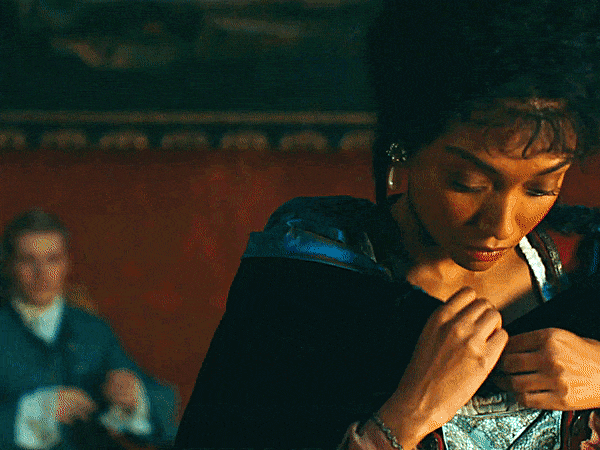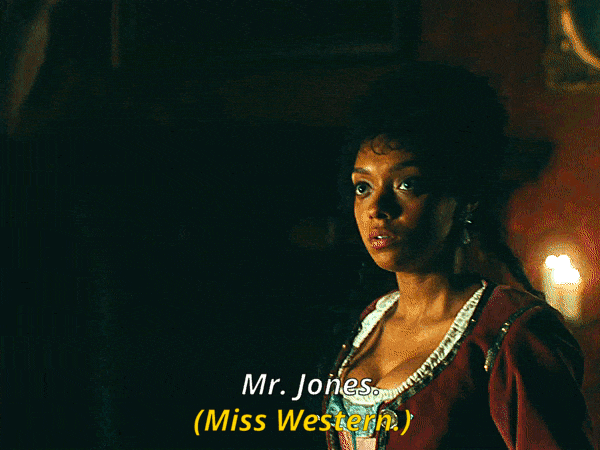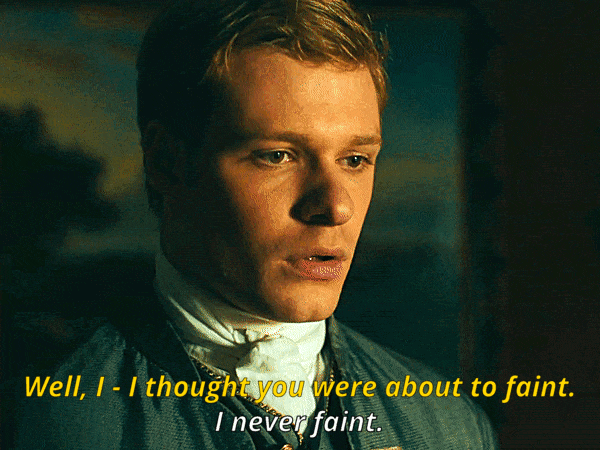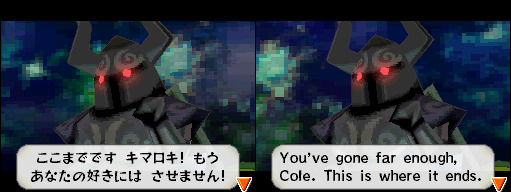#and expressed the exact vibe and tension in the context of these specific versions of the characters
Text










TOM JONES (2023) // THE HISTORY OF TOM JONES, A FOUNDLING (1749)
#tom jones#tom jones 2023#tom jones pbs#tom jones itv#the history of tom jones#perioddramaedit#perioddramasource#onlyperioddramas#sophia western#sophie wilde#solly mcleod#tom x sophia#my edits#my gifs#yea we're getting more unhinged in here sorry#ive got SO much giffing to do for ep three so i figured id start with THE SCEnE OF ALL TIMEEEEEEE#ive admitted to missing some of fielding's dialogue but i actually think they rendered this scene perfectly#and expressed the exact vibe and tension in the context of these specific versions of the characters#i love Sophia denying that she almost fainted I LOVE HER SO MUCHHHH
106 notes
·
View notes
Text
Spirit Tracks Translation Comparison: Battle Atop the Demon Train

This will be a comparison of the original Japanese version and the US English localized version.
Specifically, this will cover the cutscenes before and after the battle with Malladus and Cole on top of the Demon Train.
You can also watch these cutscenes for yourself in English and Japanese. If you want, you can check out the EU English version, too.
For the comparison, the usual points apply:
Bolded is the original Japanese text, for the reference.
Bolded and italicized is my translation.
Italicized is the official NOA translation.
A (number) indicates that I have a specific comment to make on that part in the translation notes.
As you read this, please keep in mind that with translations like these, it’s important not to focus on the exact literal wordings, since there is no single “correct answer” when it comes to translations.
Rather than that, consider the actual information that is being conveyed, in which way, and why.
--
Characters in this part who had their names changed between versions:
Kimaroki = Cole, Mallador = Malladus
--
Before the Battle:
Zelda:
ここまでです キマロキ! もう
あなたの好きには させません!
This is as far as you go, Kimaroki!
We will no longer let you do as you please!
You've gone far enough,
Cole. This is where it ends.
Cole:
…言いましたよね?
私 あなた方に
言ったはずですよね?
魔王様の完全復活を
震えて 待っていなさいって…
それなのに わざわざ自分から
乗り込んでくるだなんて…
...I told you, did I not?
I most certainly
did tell you, no?
I kindly asked you to tremble in fear as you wait
for His Majesty's complete resurrection...
And in spite of that, you have
the gall to force your way up here... (1)
You again...
The Demon King's return is
nigh, you know.
Yet, here you are, making a
nuisance of yourselves!
Cole:
最近のガキは言いつけも満足に
守れねーのか? あぁ!?
You brat can't even properly do as
you're told anymore these days, huh?!
You insolent little fools!
Cole:
上等だ ガキ共! てめえらに
きっついオシオキをくれてやらぁ!
Well, bring it on, brats! You pests got a
hefty dose of punishment coming your way!
It's time you received the
punishment you deserve!
Cole:
さあ 魔王様
融合は もう完全です!!
Now, Your Majesty,
the amalgamation has been completed!!
Your Majesty! Your
resurrection is complete!
Cole:
……やっちゃってください!!
...Smash them, if you would!!
Please use your power to
destroy these two!
Zelda:
…行きますよ!
リンク!!
...Here we go,
Link!!
This is it, Link!
-
During the Battle:
Boss Title:
魔王マラドー
Demon King Mallador
Malladus
-
Zelda, when rats appear:
リンク!
助けて!
Link!
Help!
Help, Link!
-
Zelda, when rats are defeated:
ありがとう!
リンク!
Thank you,
Link!
Thank you for saving me!
-
Zelda, when taken over:
リンク…
逃げて…
Link...
Run...
You have to get away,
Link!
-
Zelda, when restraining Malladus:
今です!
光の弓矢で 貫いて!
Now!
Pierce him with the Bow of Light!
Shoot Malladus with the
Bow of Light now!
-
After the Battle:
Cole:
ま 魔王さま…
Y-Your Majesty...
Your Majesty...
Zelda:
に 逃がしません!
マラドー!
I... I am not letting you get away,
Mallador!
You won't escape this time,
Malladus!
Malladus:
ハナセッ! ハナセェッ!!
LET GO! LET GO OF ME!! (2)
RELEASE ME!
Zelda:
リンク!
き 危険です!
Link!
I-it is not safe here!
Link!
Be careful!
Zelda:
わたしに構わずマラドーから
離れてください!
Please, do not mind me,
just get away from Mallador!
Don't worry about me! Just
get away from Malladus!
Translation Notes:
The phrase I adapted as “force your way up here” is 乗り込む/norikomu in Japanese, which can also mean “get on” or “board”, as in boarding a train. However, it can also refer to breaking in, or climbing on someplace by force. In this context, arguably both meanings could work.
In Japanese, Malladus uses no ひらがな/hiragana characters when speaking, only カタカナ/katakana and 漢字/kanji. This is a visual indicator that’s sometimes used for a character who speaks in a strange way, like for example sounding robotic, in-human, or even having a heavy accent. In Malladus’ case, it’s likely meant to invoke a very loud, booming voice.
--
Comparisons & Thoughts:
Since both of these cutscenes are especially short, I included the text from during the battle as well.
Like with his previous appearances, the biggest differences here come from the changes made to Cole’s character, so discussing those will make up the bulk of this section.
-
As we’ve seen in previous scenes, a big alteration to Cole’s character in the English localization is the fact that his habit of abruptly switching between talking formally and informally has been removed.
So of course, we get more examples of that here.
In the Japanese version, when Cole begins to talk in the pre-battle cutscene, he first starts with a slow build-up, speaking in a passive-aggressive, but still quite formal manner.
There is some rising tension here, as Cole goes on almost a bit too long for comfort, about something that obviously should make him angry, while still keeping up that faux-polite speaking style.
Then, he turns around suddenly, now clearly yelling, having switched to his crude and informal style again, adding some impact to this moment.
In the English version, there is much less of a contrast or change in the way Cole talks, as always.
The set-up of the scene itself, its movement and audio, still get some of the intended effect across. But from the perspective of the dialogue, it’s weaker.
They even shortened the build-up to the moment Cole snaps, lessening the tension.
It’s another example where the Japanese version uses Cole’s outbursts for dramatic effect, which in turn doesn’t quite have the same energy in the English version.
-
Continuing from the last point, there also things worth mentioning regarding the actual content of what Cole says here:
…I told you, did I not?
I most certainly
did tell you, no?
I kindly asked you to tremble in fear as you wait
for His Majesty’s complete resurrection…
And in spite of that, you have
the gall to force your way up here…
You again…
The Demon King’s return is
nigh, you know.
Yet, here you are, making a
nuisance of yourselves!
In the Japanese version, Cole is specifically calling back to what he told our heroes at the end of their previous encounter: “Now please tremble in fear as you wait for that moment!!”
Meaning that Cole’s anger here is not just due to Zelda and Link getting in their way again, but also because his order was defied on purpose.
The English version has no such callback, even though they did adapt Cole’s line from back then fairly accurately as: “I would suggest you tremble in fear!”
I’m not sure if this connection just went unnoticed, or if it was omitted intentionally.
In any case, I think it’s a missed opportunity, since acting petty over this adds to Cole’s character, makes the individual cutscenes feel more connected, and they did have a good set-up for it in their version, too.
-
Next is the line Cole says right after.
It’s short, but I think the differences are kind of important:
You brat can’t even properly do as
you’re told anymore these days, huh?!
You insolent little fools!
First of all, in Japanese, this line continues to show how Cole really is genuinely pissed off about the fact that his order was defied, as ridiculous as that is.
But it also goes a bit more personal.
Here, Cole again refers to Zelda as ガキ/gaki or “brat”, which he also called her when he revealed his true nature. And while singular/plural is usually ambiguous in Japanese, the context here makes it a lot more likely he is addressing Zelda specifically with this line.
Adding to that, we also see Cole express frustration at the fact that Zelda has stopped listening to him. And that’s a nice detail, serving as a reminder of the history between these two characters.
For years, Zelda grew up with Cole acting as an overly controlling, malicious authority figure, who was only raising her to use as a sacrifice one day, and thus tried his hardest to stomp every last bit of confidence and agency out of her.
And from what we can gather, she did act obedient to him for the longest time, until the recent events moved her into action.
So now Cole is not just facing some child that is about to throw a wrench in his plan, he is facing a child that he himself raised to never defy him like that, who has broken out of his control in a way he never thought she would be capable of.
By comparison, the English version feels a bit more generic, not really alluding to the personal history between Zelda and Cole as strongly.
It comes off more as your standard annoyance with meddling kids.
-
When Cole calls out to Malladus, in the Japanese version he says that the “amalgamation” is complete, rather than just the “resurrection” like in the English version.
This is referring to something that has come up occasionally, namely that Malladus basically has to completely “coalesce”, i.e. merge with Zelda’s body in order to make full use of it.
I’m assuming the English version changed this line to make it a bit simpler. The fact that Malladus is now fully accustomed to Zelda’s body is already evident from the context, so the exact details aren’t needed.
-
Another small detail about this line from Cole:
…Smash them, if you would!!
Please use your power to
destroy these two!
As usual, the English version has Cole be more consistently fancy when he talks, but there is something funny about his line in Japanese here.
In this line, Cole mixes his different speaking styles in a kind of amusing manner.
He starts it off with the informal, almost childish やっちゃって/yachatte, but then ends it with the proper and polite ください/kudasai.
To me, it gives off the vibe that he is very giddy at the prospect of destroying these kids, but still manages to keep enough self-control to not accidentally insult Malladus by using an improper ending for a formal request.
Either way, it’s a fun little moment that plays with his odd speaking habits.
-
When the battle begins, the English version has the boss title simply read “Malladus”, rather than displaying his full title like the Japanese version does.
They did the same thing with Byrne’s battle earlier, so I already talked a bit about this.
Just like in that instance, I don’t know if I would consider Malladus a character who warrants having such a reference to the Ocarina of Time battle with Ganon.
I think Malladus’ battle here is probably a better choice than Byrne’s battle, but I still don’t feel that comparing him with Ocarina of Time’s Ganon like that works.
And even if it did, doing this reference twice in the same game makes it lose its impact.
If they really wanted to do this, they should have picked one of the two battles, rather than doing it for both.
-
Finally, Malladus gets to speak his first real words at the end of this battle.
In the translation notes I explained the unusual way his dialogue is written in Japanese.
As I mentioned there, I think in his case it’s likely supposed to show his voice feeling unnaturally loud and booming, like something you would expect from a powerful demonic being.
The English version seemingly adapts this here by writing his dialogue in all caps, which I think works well enough.
However, they’re not consistent about this, since they drop it the next time Malladus speaks.
As a result, Malladus’ English line here just seems like he’s simply yelling in hindsight, not like there is something inherently different about the way he sounds.
-
All in all, the localization in these cutscenes is another mixed bag for me, but different from the last part.
I think pretty much all of Zelda’s dialogue in this one was localized perfectly. The problem is that she only makes up about 30-40% of it.
Cole takes up the majority of the dialogue here, and while I normally think the English version’s take on him works well at being itself, in this scene it’s just not as good as the original.
In this part, we aren’t just dealing with his basic characterization being changed as usual, he also doesn’t have a comparable amount of energy in the English version.
Since this is the final direct confrontation with him, acting as somewhat of a climax to his dynamic with Zelda, it’s a bit of a disheartening note to end on from a localization perspective.
The English version’s take on Cole has his own style of splendor, and it would have been nice to see it utilized better in these cutscenes here.
But that’s the end of this part. Feel free to check out the next one!
--
< Previous Part | Start | Next Part >
--
#legend of zelda#the legend of zelda#tloz#spirit tracks#legend of zelda spirit tracks#legend of zelda translations#spirit tracks translations#my translations#spirit tracks comparisons
8 notes
·
View notes